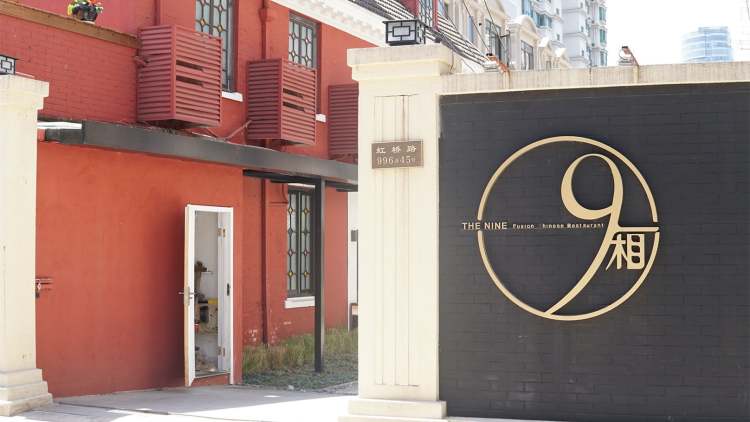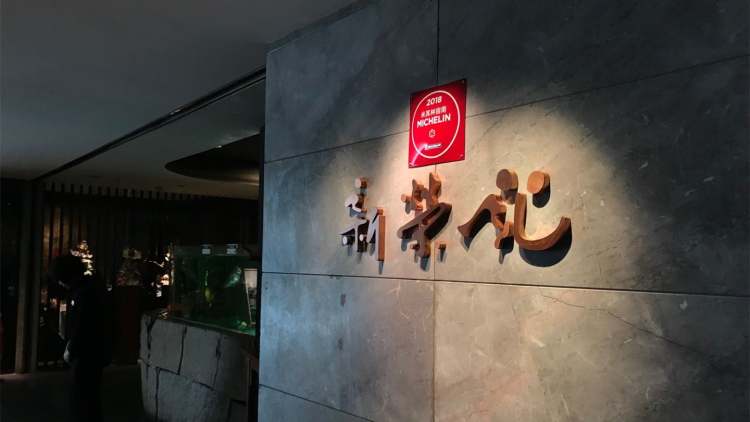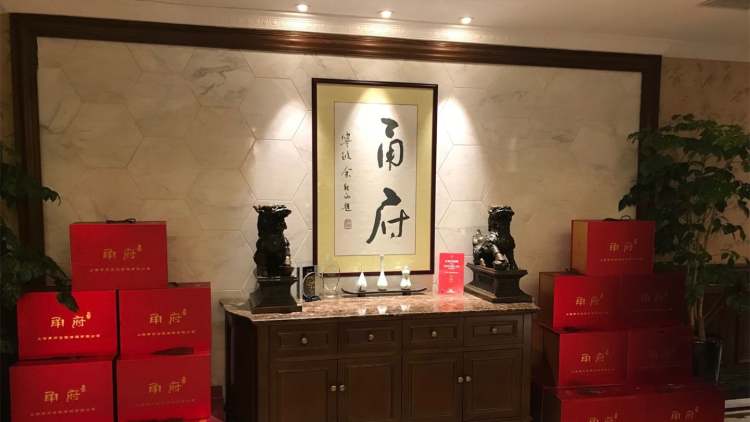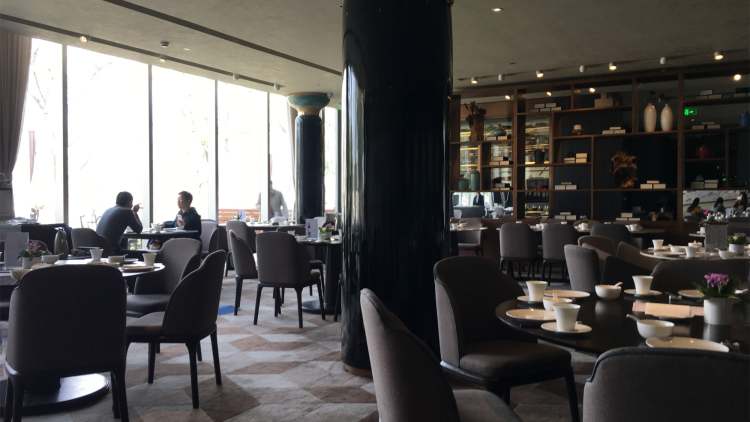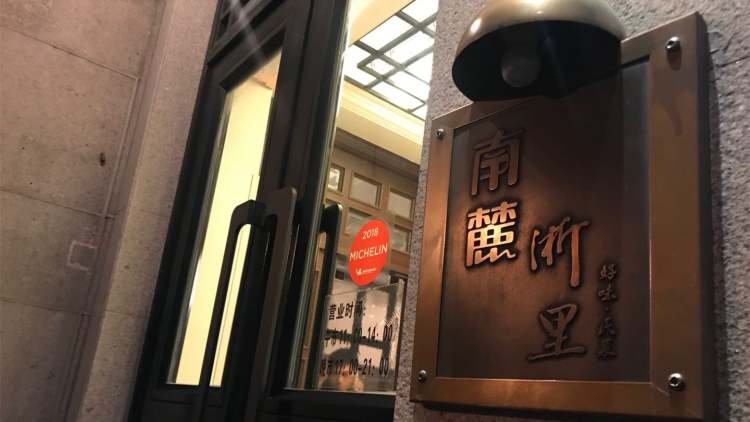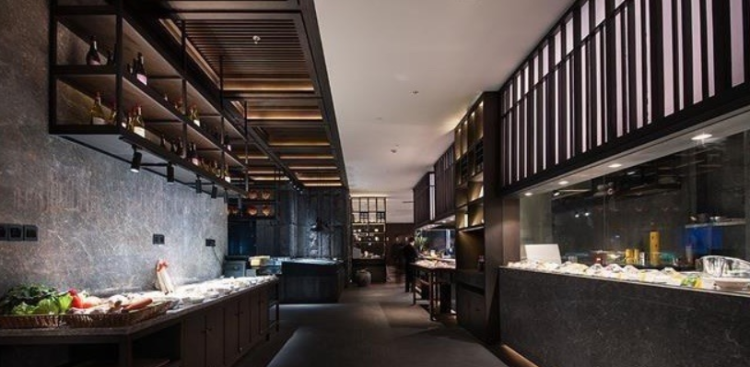Nine compartments are hidden in the 996 lane of Hongqiao Road, a drop of old houses, is a private restaurant based on Yongbang cuisine, "nine compartments" is the homonym of "wine fragrance", take "wine fragrance is not afraid of deep alleys" meaning. The old house was originally the mansion of Shanxi Marshal Yan Xishan in Shanghai, and the owner of Jiuxiang took over and restored and renovated it, and opened in July 2017.
After the renovation, Yan Xishan Mansion has a new look, the exterior wall is a low-saturation red, without losing its charm, the interior wall is white and plain, and the handrails and basins are inlaid with gold embellishments. In the private room, there are marble countertops and rose-red wall blocks, acrylic seats and crystal lamps, and the same tableware as the G20 State Banquet "West Lake Feast".
Hu Binbin, the head chef of Jiuxiang, is a native of Ningbo, although he is not from a professional class, but he has been feasting in the countryside with his uncles and uncles since he was a child, and has a deep understanding and cooking experience of the "Yongwei" in the countryside. Ningbo cuisine is the foundation of Jiuxiang, but the chef also incorporates Western and Cantonese cuisine into the restaurant's menu. The restaurant does not have a fixed menu, but has a fixed meal standard, less than 5 people will eat at 3000 yuan a table, more than 5 people together, there are 588 yuan, 788 yuan, 1088 yuan per person three prices to choose from, need to make a reservation in advance, advance deposit, the restaurant according to the day's ingredients configuration menu. There are only 5 private rooms, and they are often fully booked.
At the beginning of the seat, fruit was served before the meal, and the lady was given a rose dew when she entered the table, which was quite sincere. Appetizers are common and new, jellyfish head, cheese pumpkin, honeydew melon ham, peanuts, etc., the plate is exquisite, there is no shortage of fine works, among which the jellyfish head part is excellent, thick as phoenix feet, crispy and chewy. The peanut gimmick is full, the foie gras is treated with low-temperature liquid nitrogen at minus 180 degrees Celsius, shaped into a peanut shape, the presentation is delicate and delicate, the entrance is cool, and the foie gras has a long aftertaste, but the delicacy and texture are insufficient, and the form is higher than the content.
Ningbo cuisine loves seafood, and seafood from the East China Sea naturally occupies an important position on the menu of Jiuxiang, and the seafood is directly purchased from the fishermen of Xiangshan in Ningbo in the early morning of every day, and arrives at the store within 5 hours. The ingredients of the catch vary from day to day, and the menu is adjusted accordingly. The main dish is the classic 100-second yellow croaker, which is a small yellow croaker that is freshly caught on the same day, slightly salted and dried, stewed in a stone pot in 100 seconds, the fish meat can be broken, thin as boneless, the snow cabbage is warm and salty, and the chicken soup at the base is delicious, but it is also a little too tasteful. The home-roasted pomfret is also the white flat pomfret caught on the day, and the fish soup is added to the cooking, and the Ningbo rice cake at the bottom is also the highlight of the dish. The cuttlefish in the wing room is a plate of two flavors, the dry-fried hairtail is slightly marinated and air-dried, the meat flavor is stronger, and the hairtail of the meat roll is boneless and shaved, rolled up and fried, the heat is in place, and the oil is moderate. Sea-caught silk shrimp is a creative cuisine, fresh East China Sea prawns are beaten into shrimp glue, then molded into shrimp shapes, decorated with shrimp tails, wrapped in glutinous rice paper and fried, crispy and elastic, red vinegar is also the finishing touch, sobering and greasy.
Ningbo people have a variety of crab eating patterns, such as boiled crab, cooked drunk crab, inverted crab, eighteen chops, crab bone sauce and other traditional Ningbo dishes, all of which may appear on the menu of Jiuxiang. Aged Taidiao steamed white crab is the old-school inverted tuk practice, the local language "inverted tuk" means upside down, the white crab knife is cut into two, the crab feet are upside down and steam on the egg custard, the crab is fat and strong, the meat is crab roe, the flower carving is slightly sweet and deep, the silk wisps are delicious, and the egg custard at the bottom is also fed by the umami of crab meat, and the essence gathers. Crab bone sauce is a fisherman's local dish, crab meat with shell cut into pieces, green onion pepper, ginger and garlic stir-fried, with cooking wine, soy sauce and aged vinegar, the taste is sweet and sour, salty and spicy, and the seasoning level is acceptable. The ancient method of drunken crab is made of about two halves of Taihu Lake, and the river crab is not suitable for raw eating, and the nine compartments will cook it and get drunk again, and the wine taste is much lighter.
In addition to Ningbo seafood, Ningbo-flavored taro soup, volcanic rock beef, Mexican jazz duck, Xiangshan rice steamed buns, scallion oil chicken, morel mushroom fresh fish soup are also often included in the menu, or Ningbo-style local dishes, or Shanghai-style Chinese dishes, the taste is decent.
Overall, the dishes of Jiuxiang are acceptable, outstanding, delicate and beautiful, the chef has tried more cooking methods on the basis of the simple techniques of traditional Ningbo cuisine, full of sincerity, and works on the details, but the seasoning of some dishes is slightly deliberate, and there is a little less natural respect for the original taste of the ingredients, and desserts are also the weakness of the restaurant. However, the overall dining experience of the nine chambers is satisfying, the service is meticulous, the attitude is warm and cordial, the dining rhythm is staggered, and the experience is comfortable. The character and temperament of the restaurant are also quite distinctive, and it is especially worthy of special visits by diners who prioritize mood.



